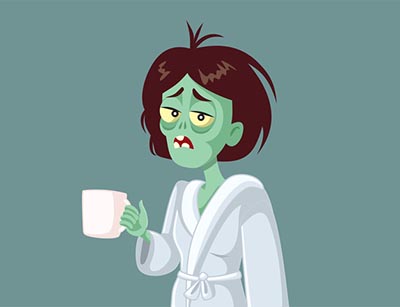
Today, I am proposing to offer you a cornucopia of tools and techniques that I have discovered over the years of helping people like you reprogram their brain to be highly effective in dealing with the traumatic experience of being sleep deprived.
My goal is to remind you of how amazingly healthy, happy, alive, energized and revivified you can feel by improving the quality of your sleep.
It’s a very complex problem that affects people differently. Lucky for us, it has been researched extensively and it has yielded an equally extensive number of readily available, inexpensive and easily implementable resources to suit everyone’s situation and preferences.
So, go ahead and scroll down to the bits that catch your attention and may be most helpful to you.
If you think you’ve heard it all already, take a quick look at The Upgrade 301 and give me a call. I guarantee you’ll be astonished at what is available today to help you feel and function a whole lot better so you can sleep better.
How does Sleep Deprivation affect us?
Did you know that fully 30% of people worldwide are sleep deprived? 30%!! That’s about 2 billion (2 000 000 000) of us zombies struggling to get through the day.
Sleep deprivation can have a wide range of negative effects on your physical, mental and emotional health. Here are some of the most common ways that sleep deprivation can affect you:
- Impaired cognitive function: difficulty to focus, concentrate and make decisions, impaired memory and ability to learn.
- Mood swings: irritability, anxiety, depression and increased risk of suicide.
- Decreased motor skills: slow reaction time making it dangerous to drive and can result in accidents and injuries.
- Weakened immune system: increased susceptibility to illness and disease.
- Weight gain: disruption to hormones that regulate appetite leading to overeating and weight gain.
- Increased risk of chronic diseases such as diabetes, heart disease and obesity.
Have I got your attention?
Clearly, getting enough quality sleep is crucial for our physical and mental well-being.
Here is the interesting part: We are too lazy to do anything about it. I kid you not. Studies show … We are too busy. We can’t be bothered. We are too tired. We just want to flop into bed and forget about everything. Except we don’t. We toss and turn and wake up at all hours of the night. Oh, we’ve read tons of articles on what we should be doing but somehow we don’t get around to it.
So I’ve done the heavy lifting for you and summarized here pretty well everything you may have ever wanted to know (or be reminded of ![]() ) about getting a good amount of quality sleep every night.
) about getting a good amount of quality sleep every night.
The Basics 101
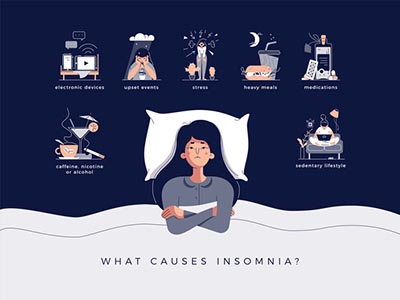
Let’s start with the bare-bone basics we already know:
The Mundane Stuff:
Sensible Sleep Hygiene
- Stick to a consistent sleep schedule: Got to bed and wake up at the same time each day, even on weekends.
- Make sure your bedroom is quiet, cool and dark.
- Use comfortable pillows and a supportive mattress.
- Refrain from consuming caffeine, nicotine and alcohol in the evening.
- Avoid napping during the day.
- Establish a relaxing routine before bedtime to help your body wind down and prepare for sleep.
- Limit screen time and avoid blue light in the evening (that means NO PHONE IN BED).
- Practice relaxation techniques like yoga or meditation.
- Use a white noise machine or earplugs to block out noise.
- Avoid engaging in stimulating activities like playing video games before bed.
The Important Stuff:
Breathing
This is a BIGGIE. Sleep apnea is a prevalent sleep disorder that affects one billion people worldwide. It is characterized by recurrent episodes of disrupted breathing during sleep that lead to daytime fatigue, mood disturbances, and increased risk of accidents or injuries. If left untreated, it can lead to serious health conditions, such as hypertension, heart disease, stroke, and diabetes.
Lifestyle modifications such as losing weight, exercising regularly and quitting smoking can help reduce the severity of sleep apnea. Clearing your nasal passages before going to bed using natural nose sprays or a netti pot, for example, can restore healthy breathing and prevent frequent awakenings. Medical treatments such as CPAP, oral appliances, positional therapy and surgery can also be helpful.
Choose the modalities that work best for you to eliminate breathing obstruction and improve your sleep.
Circadian Rhythm
Did you know that the sun, vitamin D and your body’s internal clock all work together to help you sleep better? Sunlight exposure stimulates the production of vitamin D, which helps regulate your sleep cycle.
Your body’s internal clock, also known as the circadian rhythm, depends on natural light and darkness to keep you alert during the day and asleep at night. If your circadian rhythm gets messed up, your sleep will suffer. This is particularly problematic in the Northern Hemisphere.
Get outside when the sun is shining and soak up some of those beneficial sunrays. Be sure to include a healthy dose of vitamin D to your daily diet.
Nutrition
We are all familiar with the negative effects that heavy, fatty, sugary and junk food and beverages can have on our health. But do we stop and think of the effects they have on our sleep? Any food or beverage you consume during the day that causes discomfort, indigestion, heartburn, spikes in your blood sugar levels, weight gain or restlessness will carry over into bedtime and lead to a poor night’s sleep with frequent awakenings.
Need I say more?
Exercise
Several years ago when my eczema was causing me considerable loss of sleep, I came across this very simple formula:
The amount of energy you expend during the day is directly related to the amount of sleep you get at night.
Think about it. Do you find yourself tied to your desk, telephone or computer for hours or days on end? Do you take regular breaks to move around, go for a walk, stretch or slip out to the gym as often as you can?
Exercising makes you physically tired, reduces stress and anxiety and makes you fall asleep faster. It helps regulate your body’s internal clock (your circadian rhythm) and establish a consistent sleep schedule.
Supplements
Some of the best supplements for improving sleep include:
- Vitamin D, probably the most effective and less commonly used sleep aid, supplements the amount of sunlight exposure we require (and may not get) every day and produces serotonin that helps regulate the sleep-wake cycle.
- Melatonin is a hormone that can increase the amount of time you spend in deep sleep, the most restorative phase of sleep.
- Magnesium is a mineral that has calming effect on the nervous system.
- Valerian Root is a herb that has been used for centuries to promote relaxation and reduce the time it takes to fall asleep.
- Lavender is a plant that is known for reducing stress and anxiety levels.
- Chamomile is a natural herb that contains compounds that have been shown to have sedative effects.
Medicating
My wife often says: “We all need a pressure release valve” (like the one on the pressure cooker her mother used when she was a girl). So when we’re exhausted, stressed, anxious or depressed, we may understandably turn to ‘pressure release valves’ such as prescription or over-the-counter medicines, drugs, alcohol, nicotine or any other preferred method.
While these solutions may provide some relief, they can also mess up your sleep. Some will make you sleepy during the day, others will interfere with your normal sleep and dream cycles, especially if they have stimulating properties. And then there are the side effects like night sweats, restless legs or vivid dreams.
Everyone reacts differently to medication, so we need to use our own better judgement based on observed versus expected, what has worked best or made matters worse for us over the time we have been sleep deprived.
The Boosters 201
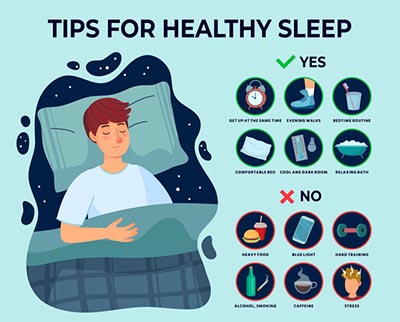
Here are a few of the more common and effective therapeutic modalities that go hand in hand with, support and enhance The Basics. I highly recommend every one of them.
- Acupuncture – Find the pressure points on your body associated with sleep and massage them briefly (see Try this below for example).
- Massage Therapy – I’m sure I don’t have to sell you on the relaxing effects of a massage. Get one as often as you can.
- Music – Play soothing background music during the day and find ‘music for sleep’ on YouTube to play uninterrupted all night long while you sleep (see What I’m Watching below for example).
- Audiobooks – Choose long interesting but monotonous stories from the huge free library on YouTube and play them on low volume while you fall asleep.
- Mindfulness Meditation – Many excellent relaxing guided meditations available for free on YouTube.
- Drumming – Ideal for lowering your heartbeat as you prepare to go to sleep.
- Aromatherapy – Fill up an infuser with your preferred herbal essence close to your bed.
- Yoga – Yoga incorporates deep breathing and relaxation techniques that help to calm the mind and relax the body, preparing it for sleep.
- Self-Hypnosis – Very effective for inducing a state of relaxation and calmness, reducing stress and anxiety and eliminating negative thoughts.
- Body Scan – Body Scanning reduces any tension held in different parts of the body that can interfere with falling and staying asleep.
- Havening – Havening is the use of touch, attention and imagination to create delta waves in the brain which are associated with deep relaxation and a sense of safety.
- CBD Oil – By interacting with the body’s endocannabinoid system (ECS), it helps regulate sleep, mood, appetite and other physiological processes.
- And much more ….
I guarantee that if you use even just one of these regularly in the evening, it will make a significant difference. What have you got to lose (except for sleepless nights ![]() ?)
?)
If you are not familiar with some of them, ask Mr. Google to fill you in on the details. If you would like more guidance or instructions on some of the others, please drop me a line or call me and I’ll be glad to take you through them.
The Upgrade 301
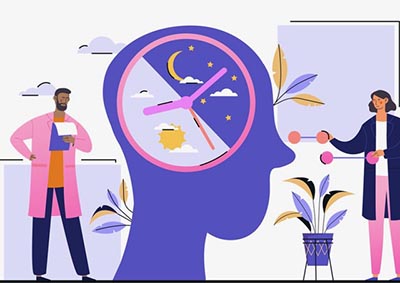
This is where I can be of most help to you.
While all of the modalities described above are excellent at providing some much needed relief, they are designed to alleviate the symptoms and are therefore temporary measures.
If you are looking to remedy the causes of your anxiety, stress, depression or any other mental health issues that are keeping you up at night, there is a lot we can do in short order to not only improve your sleep but to rid you of these debilitating feelings.
Together we can work out a sensible plan to help you reprogram your brain so you can feel and function a whole lot better, so you can sleep better.
Give me a call at +1 760 333 3348 and let’s chat about what’s keeping you up at night.
We will look at some of the most relevant tools and techniques that Neuroscience offers us today to calm your brain, improve your moods, reduce negative emotions and rewire those harmful behavioural pattern connections that are making you miserable, while you sleep, in fact. How cool is that?
The best part about rewiring our brain to achieve anything that’s important to us, like good sleep, is that the results are permanent regardless of our past or current circumstances. And if we can do that while we are asleep, bonus!
Try this:Here is a relatively unknown and surprisingly effective way to ease into sleep that only takes two minutes when you go to bed at night:
That’s it. Easy Peasy. Sweet dreams! |
Let me know how it goes for you.
- How well do you sleep?
- What are the most effective ways you have used to improve the quality of your sleep?
- How much better would your life be if you slept well every night?
Post your questions or answers below and read what others are saying.
What I’m Watching:
This little jewel is called No More Insomnia – Fall Asleep Immediately.
It’s 11.11.11 long with no interruption.
Play the sound as low as possible so you can barely hear it but it is still in your conscious awareness.
It will ease your mind with delightfully soothing sound waves and music while you fall asleep. If you wake up during the night, it will still be there to rock you gently back to sleep.
InJoy!

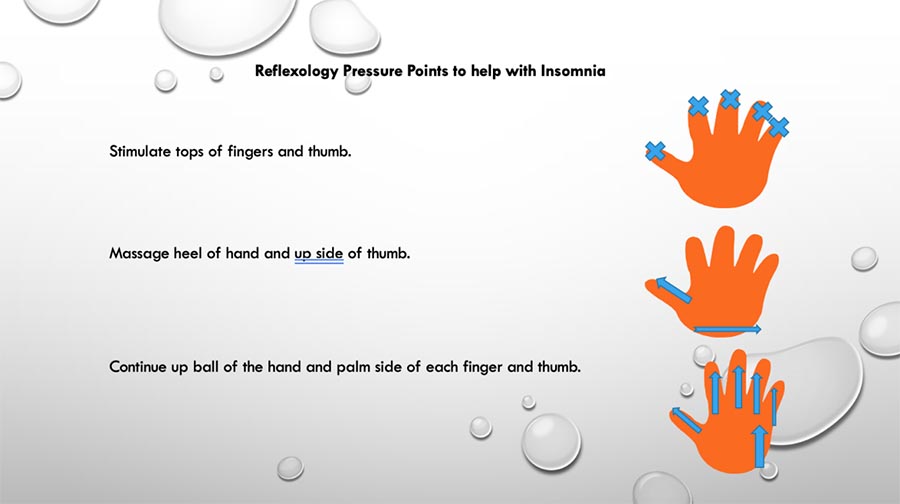
Leave a Reply